There is a woman in a forest. Or maybe on a highway by a cornfield. At the doorway of a condemned building.
And she knows that something is wrong.
She is often accompanied by a date, a boyfriend, maybe a few friends. Maybe they’re kissing. Maybe everyone is drinking. Maybe they’re on vacation. And she abruptly stops having fun because something is off. The air is charged, the silence more silent than usual, the dark is full of eyes. But her boyfriend keeps kissing her, her friends are too drunk, the group wants to break into the shuttered old house. She says no, and she is teased or berated for being a buzzkill. She is weak for insisting that something is wrong, that more caution is called for than they would prefer to exhibit. She is making it harder for her boyfriend to investigate, to prove to her that he is tough enough to keep her imagined monsters at bay. All she wants to do is leave.
Someone (or everyone) dies that night. Of course they do. You knew you were watching a horror movie, so what did you expect?
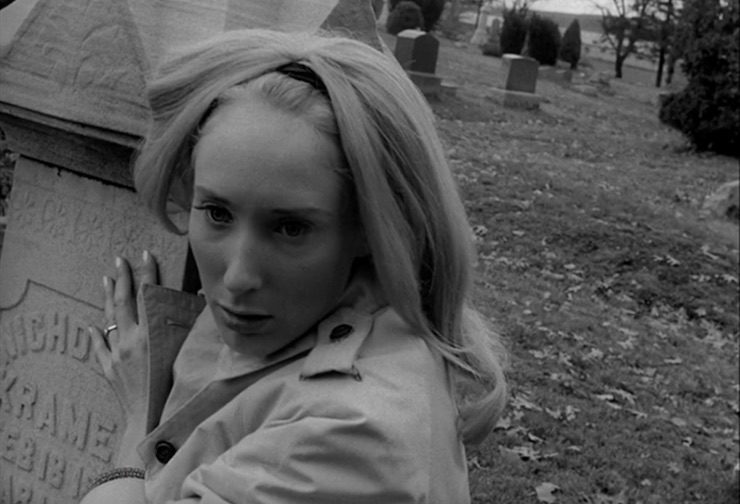
This is one of horror’s most common tropes, and one that doesn’t presume the same morality judgments as your average slasher film. Horror buffs everywhere know the rules for those films (or Randy from the video store explained it to them back in 1996): Do not have enthusiastic, consensual sex. Do not drink. Do not do drugs. Do not get cocky and assume that you’ll make it back from somewhere spooky-looking. If you do, you’re immoral, sinful kids, and it’s no wonder that a bad masked villain came after you with a knife.
But what about the girl who never wanted to be there in the first place?
Because that young woman is all over the genre too, though she often doesn’t land the lauded “final girl” spot. She is Cheryl in The Evil Dead. (Why are we going to a cabin no one has seen before?) She is in her fair share of Supernatural episodes, right at the opening. (I am not going in there. Please don’t go to check and leave me alone.) She is Barbara in Night of the Living Dead. (Stop reminding me how frightened I am of the cemetery.) There are plenty of variations on this theme, even clever subversions of the trope—Scream relies entirely on misdirecting the audience by using this exact setup, when the person telling Sidney Prescott that she should stop worrying and dwelling on the past turns out to be the very person she should fear the most. There are even non-lethal versions where everyone makes it out just fine: Hocus Pocus all goes down because some teenage boy won’t listen to his little sister when she pleads with him not to light a candle that is meant to release the Sanderson Sisters. Whoops.
These moments are often fleeting, so rote that they’re the subject of parodies and jokes now. Community’s “Horror Fiction in Seven Spooky Steps” opens with Britta telling the group one scary story that involves a couple in a car making out, and the man only agreeing to look into the noise his lady friend keeps hearing on the guarantee of sex afterwards. Joss Whedon has made a career of scratching at this veneer; from Buffy flipping the trope of the girl who fears the darkness and instead rushes out to meet it head on, to how The Cabin in the Woods frames these scenarios as part of a larger (and usually unseen) ritual that scientists can script and alter with the flip of a switch. Michael Jackson’s girlfriend in the Thriller music video is told that she shouldn’t be scared of “only a movie,” then proceeds to be terrorized by zombies in a tongue-in-cheek musical homage to this tried and true narrative pitstop.
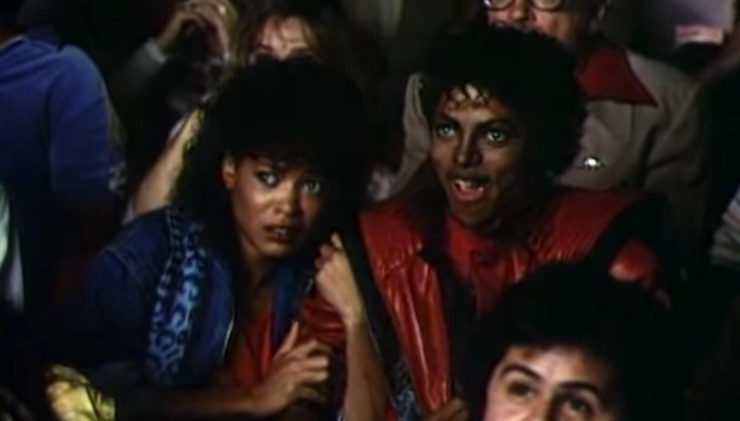
Horror exists as a genre primarily to reflect the ugly and the despicable parts of our world back at us through a funhouse lens that makes the trauma digestible. Most fans of horror know this and will tell you so; Frankenstein is about the terrifying possibilities that science and technology might visit on us; Invasion of the Body Snatchers told the story of what happened to a world beset by McCarthyism and Cold War anxieties; Get Out has shown us how the racism of white liberals is every bit as menacing as its more vitriolic counterpart. Some of these lessons are cautionary, which explains all the teenaged kids making bad spring break choices. But some of these lessons are simply mirror images of terrors we know all too well—like a girl telling someone that she isn’t comfortable, and being told in response that she’s the worst kind of downer for daring to admit it.
I hate this trope more than anything, perhaps because of its ubiquity. Or perhaps because it asks the most basic question of all, one that our society struggles to answer even to this day:
Why didn’t you believe her?
She told you she heard something, or saw it out of the corner of her eye. She told you she was scared, that she didn’t want to go into that boarded up house or creaky old cabin, that she didn’t want to keep making out, that she didn’t like this corner of the woods. She told you she was scared and you laughed at her. She told you she had a bad feeling and you thought it was adorable. She whined at you and she tugged at your sleeve and sometimes she even begged you to leave it, to just go home deal with it all later. You thought that made her a wet blanket, or worse, a tease. As though that somehow mattered more than the sanctity of her life. Or yours.
But she was right. And you were wrong. And if you had just listened….
Every woman knows what this feels like, they know what it means. They know how hard the world works not to believe them. And this particular narrative device always feels like a pointed jab, a great big spotlight on that precise problem. It doesn’t even matter if it’s intentional—in fact, the idea that it might be unintentional makes it all the more poignant. Filmmakers and scriptwriters accidentally pointing out how women’s fears are never taken seriously, again and again. And why would she have that sense when no one else was bothered? Oh, you know… probably women’s intuition? Women (especially “good” women who aren’t distracted by things like games and alcohol and maybe sex) in movies are excellent at picking up on what others don’t. You know how it is.
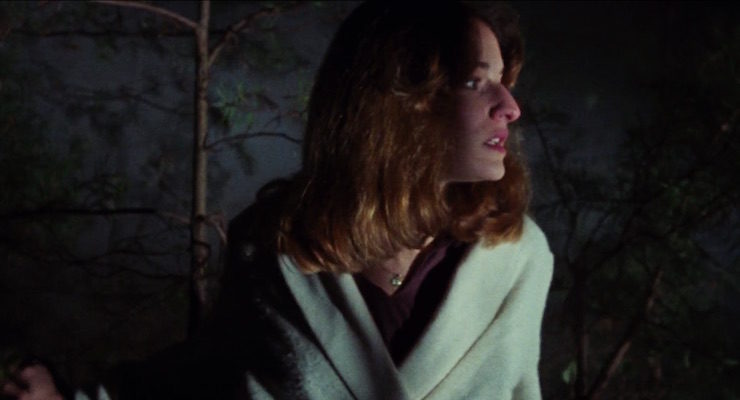
But intuition is not a magical power granted to half the population by sheer random happenstance. It’s not the consolation prize you drew because the world calls you a woman. Intuition is an ability built up over time, powered partly by animal instinct, and partly by learning, and partly by experience. Intuition is what happens when you fill up any computer with enough information and allow it to draw conclusions from the patterns it observes. Any human being can tap into intuition, but women are constantly pegged as the humans who own this preternatural ability. Why? Because women are supposed to be on their guard every second of the day. Because our very existence, in the right skirt or pair of high heels, is an invitation to untold abuses. Because we’re not supposed to trust anyone—but we’re supposed to be unfailing sweet to everyone. Women are intuitive because tapping that intuition is something that we are encouraged toward from the day we are born, for the sake of our safety and our lives. Which is where we end up coming to the ugliest question of all:
Why was that intuition on alert in the first place?
Because this little introduction scene, the stage-setter for your next favorite gore fest, is completely dependent on some young woman who walked into this situation scared. And not by monsters that go bump in the night, but by the people that she is keeping company with. She noticed the sound or the shadow when they didn’t, because she already knows to be frightened. The tacit threat is always there; what if she doesn’t want to do what everyone else wants to do? What if he isn’t what he seems? What if getting away from the prying eyes of neighbors and parents and CCTV was a terrible mistake?
And what happens out here in the middle of nowhere if she decides to say no?
Abandonment, for one. Or maybe being left alone outside/inside while the others venture elsewhere. She could be laughed at. Ostracized. Coerced, regardless of her complaints. And of course, there are far worse options that wait at the end of the Why Didn’t You Agree rope. Ones that are never far from any woman’s mind.
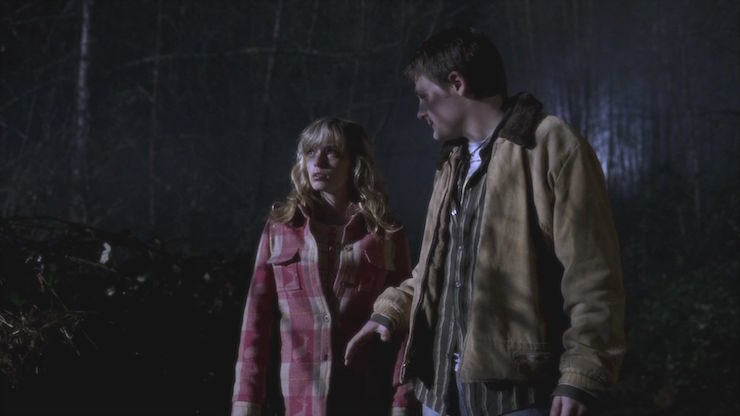
So of course she’s the one who notices that something is amiss. It’s not because girls are smarter than boys, or more pragmatic or less brave. It’s because women know that it’s their responsibility to prevent harm from coming to them. Because no one will believe that it wasn’t her fault. Because no one will listen. Because bad things still happen to women who don’t keep their guard up, who don’t carry keys like claws and check the back seats of their cars before getting in. Bad things still happen to women who break rules, even when everyone else seems to be getting away with it.
The truth is, she didn’t need to be more careful. She needed to be heard.
If she dies here it will be a mysterious tragedy, and likely a pit stop on some swarthy male hero’s journey. He will go to her family’s house and ask questions: How long had she been dating Brandon? Did she enjoy school? Were any of the friends in that group new? Was she ever interested in the occult? Sorry, it’s just a routine question. If she makes it and Brandon dies, the police will want to talk to her: What were you doing out there? Why didn’t you check in with your parents? Were you sleeping together? Did you ever quarrel? Answer the question. If she survives, it’s a different kind of trauma that she carries with her. She will hoist it onto her back like an overstuffed schoolbag and tote it wherever she goes, a testament to the fact that all the intuition in the world couldn’t keep her safe.
Seeing it constantly trotted out in front of you, it sticks somewhere in your chest or maybe your throat, like a great big gravelly pill struggling to get down. Watching so many different women do something so reasonable and get ignored entirely, and knowing that this scenario isn’t questioned because it is so entirely familiar. It is mundane. Commonplace.
Horror reflects the world back at us. And this little hook, this oh-so-common point of entry into a world of terrors… it’s really just an unanswered question hanging in midair. It’s a warning for everyone who doesn’t rush out of the movie theater or turn off the television. It’s a message carved into a plinth, sitting off to the side in every strange forest, every damp basement, every remote cabin, just out of sight:
Listen. And believe her.
Emmet Asher-Perrin would never feel bad for refusing to go into the house. You can bug her on Twitter and Tumblr, and read more of her work here and elsewhere.










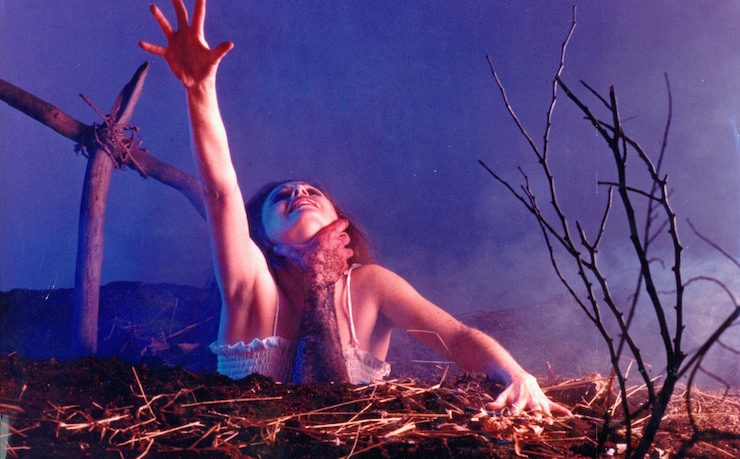
As a male, I’ve always hated this trope as well. Mostly from the viewpoint of, why the hell are guys always portrayed as some idiot who can’t understand his surroundings. You see this in many genres, not just horror. Sitcoms are filled with the “stupid lazy male” trope more than any other genre I think.
The idiocy of males to dismiss females has always been costly; the trope described makes the dismissal cost everything, it seems to me…
It’s Apollo’s curse on Cassandra: to know what’s going to happen, but never to be believed.
Incidentally, some versions of the legend say that Cassandra also taught her brother Helenus to be a prophet but, unlike her, people always listened to him and believed what he said.
Which couldn’t possibly be a metaphor for anything …
This is a great post, thanks for it.
In metanarrative terms, if the guys didn’t ignore the gals’ warnings, we would have some seriously short, boring movies on our hands. Went to the creepy old house, got weirded out, went home & watched Netflix.
In real-life terms, if a woman says something feels off about a situation, listen to her and scram on out of there. For those of you who find the “men as morons” trope grating, remember that the screenwriters are generally men.
Thanks for this. It reminded me of Rocky Horror, and Brad patronizingly telling Janet “It’s all right, everything’s going to be all right”. At least RHPS makes it clear that he’s a jerk. (And Janet survives, which is better than some horror movies manage.)
As Anita Sarkeesian once pointed out, “One of the most radical things you can do is to actually believe women when they talk about their experiences.” And she is right.
This was well said, thank you.
I recently watched an old Hammer film called ‘The Snorkel” (it’s better than it sounds). Quite a decent little thriller…except it all hinges on the fact that nobody believes the main character (a teenage girl) when she says she saw her now step-father murder her biological father. “Oh, you were a child. You couldn’t understand what you were seeing…”
So the character has in effect been living with a man she knows to be a murderer for several years when the film starts.
Yikes.
This is a great article and I probably don’t have a ton to add. (Especially the stuff about intuition and awareness of surroundings/bad vibes relating to woman’s need for constant vigilance which I never thought of before in that context).
I wonder if in some ways it also hinges on the need for men to appear ‘brave’ or protective…so they’re just going along with those roles. The woman is ‘supposed’ to be overly cautious, scared, hysterical, what have you, and the man is supposed to make everything okay and deal with it.
On this subject, I would like to recommend the book, “The Gift of Fear”, by Gavin de Becker. It’s not just about listening to women, it’s about listening to YOURSELF. The women in this trope are victims of their own self doubt, which is probably caused by being treated like an idiot all the time.
And… the first two comments on a post about how women are silenced and ignored turn it around to be about how it makes men look…
I’m kinda surprised you didn’t mention the the “Cassandra metaphor (variously labelled the Cassandra ‘syndrome’, ‘complex’, ‘phenomenon’, ‘predicament’, ‘dilemma’, or ‘curse’) occurs when valid warnings or concerns are dismissed or disbelieved” in context with this story. In many ways, ignoring a woman’s foreboding has existed as a trope since at least 600 A.D. (Ancient Greek mythology). To quote Wikipedia, “The Cassandra metaphor is applied by some psychologists to individuals who experience physical and emotional suffering as a result of distressing personal perceptions, and who are disbelieved when they attempt to share the cause of their suffering with others.”
The Shining has always been one of my favourite films (at least in the horror genre). In some ways it does the reverse of this trope. Wendy starts out trusting her husband; the horror turns out to be him (well that’s the metaphor even if there’s all sorts of hints about demonic possession, the old Indian burial ground etc). I’m sure I remember scenes where Wendy also tries to warn Jack that something is wrong and he doesn’t listen, but the point is not that he doesn’t listen, but that he is the horror.
I’ve been listening to true ghost story narratives on YouTube. This same stupidity applies to children and their experiences with the supernatural. The adults dismiss the child’s true terror and leave them to the predators. I’m also very strongly reminded of pedophiles who are free to prey because the adults don’t listen or pay attention to their own intuition.
Showering you with gratitude for this piece. Thank you.
Fantastic post. Loved it. Have shared it twice now because I think that people who aren’t horror readers dismiss it all to quickly when it’s saying something important!! It’s a mirror, just like you say, reflecting the world back to us. Thanks for your thoughts.
I think the portion of the article on why women are more intuitive and aware of their surroundings being a symptom of their constant need to be on guard against things “that are never far from any woman’s mind” is quite interesting and perhaps something most people never think of. It does indeed reflect society’s dismissal of women’s credibility.
However, as to why any random “Cassandra” on any given film (especially a horror feature) is not believed when she claims a monster/zombie/Slender Man lies in the shadows, the reason is simply statistics: the odds of any given group of teens embarking on any given ill-considered, night-time adventure ending in anything more than a few scared laughs and pointing and “Brandon almost peed his pants when the bat flew out of the attic” anecdotes are minuscule. If we all stopped doing anything mildly risky because a person in our group felt uncomfortable, we’d get up to very little indeed. Parent certainly have a sense of unease and foreboding when their children set off for camp or boarding school or university, yet would you advocate we all stay indoors, within sight of mum and dad and the local law enforcement for the duration of our lives? Should we never go on vacation, hike, climb a mountain, swim in a lake? In any group of people large enough there is certain to be one who thinks the trail is too rough, the rock too steep, the water too murky.
I don’t think the dismissal of Cheryl’s or Barbara’s fears in itself is misogyny or cause to think society (and their male companions) consider them too weak or soft or adorable. It is the way in which those fear are dismissed that put a harsh light on male arrogance. But that, like many other tropes can be addressed by film-makers with more modern sensibilities. They can still dismiss the fears (otherwise there’d be no film) but without the dismissal coming through as the patriarchy imposing its beliefs; instead they can do it, as I write above in a way that points out the irrationality of the fears (as surely all fear of the supernatural – even in a horror film – must be considered irrational until the monster reveals itself).
Holly Molly, what an insightful piece. Unconfortable too, to realize I see it all of the time, and never got to thinking “this is why”.
Asimov lampshaded this in the (non-horror) story “Feminine Intuition”:
If we’re talking about tropes, let’s also discuss the trope about women having special intuition that men don’t possess. It’s a myth that is common to television and film.
In my experience as a woman, women are more timid in unknown situations and less tolerant of “decay” than men. By “decay”, I mean anything that is dirty, run down, worn, bug-infested, and so forth. I’ve seen this countless times while camping, hiking, and cleaning out old homes. The female avoidance of “decay” has nothing to do with a supernatural intuition, and everything to do with our upbringing.
If a group of young people go to an old cabin in the overgrown woods for a fun weekend, and one or more of the women hesitate to go inside, there is absolutely no reason for the men to think there’s something supernatural lurking inside. That would be completely ridiculous. These stories take place in a world where normal people don’t know that anything supernatural exists. In the real world, have you ever actually avoided a place because your intuition told you it was haunted? For any rational person, the answer is “no”.
@@@@@20. GrandArcanian
I don’t think the slope is as steep or as slippery as you would have us believe. Climbing a mountain and having unspecified fear of being hurt is pretty different from “that house creeps me out and if we go in there we’re all going to die“. And in any case the discussion isn’t only “how shall I discount your fears”, it’s “how shall I discount your fears 10x more often if I’m male and you’re female”?
Lacking other context, it can be hard to classify single acts as sexist or misogynist. But given enough context, patterns do show up. And I think that’s the discussion here: this is a pattern we’ve observed, and hey it kind of sucks.
And I think that if you consistently dismiss my concerns, no matter how well grounded they are, or how polite you are about it, then you’re kind of being a jerk. Being polite might actually make things worse. Politeness might leave the impression that if I could just be a little more reasonable then you might give my words some weight. But if you just say “I’m a man and you’re a woman and I will never take your opinions seriously”, then hey at least then I know where I stand. (Which will quickly be somewhere else, thank you very much.)
Oh, I don’t know. There’s an xkcd that posits a zombie outbreak unexpectedly nipped in the bud, which goes on to be a romantic comedy for the remainder of the film. I think that could work in a horror movie too. Or maybe just don’t have a woman have misgivings which are then ignored and/or ridiculed by a man. Just don’t do it. That could probably work too.
And hey maybe it would work better. The woman expresses concerns. The man agrees and they work together to address said concerns in a reasonable manner. They might even turn back. This could go back and forth between the two (or within a group), discussing misgivings, weighing risks, taking actions to ameliorate said risks, and so on, as the tension mounts and the noose metaphorically tightens. And the villain gets them anyway.
@20 GrandArcanian, I agree with you.